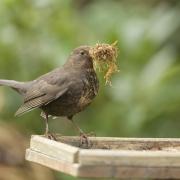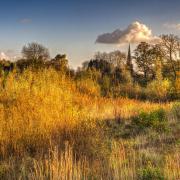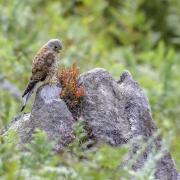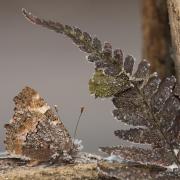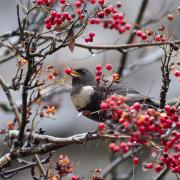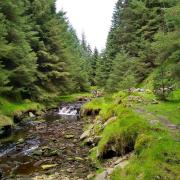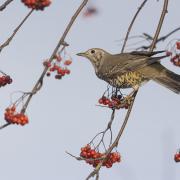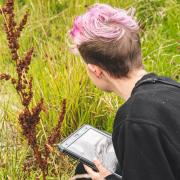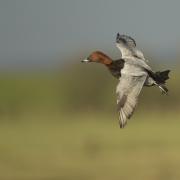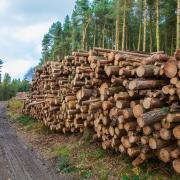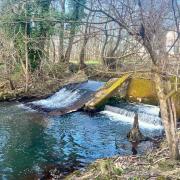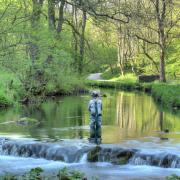Mark Cocker is one of Britain’s foremost writers on nature and a passionate advocate for biodiversity and was recently appointed as an ambassador for Friends of the Peak District.

Take a walk with Mark Cocker past the ponds and through the hills of Lightwood in Buxton and it will quickly become apparent the naturalist and author is something of a local celebrity. We arranged to meet there on a cold March morning and it didn’t take long for a shout to ring out from the ponds below the path. ‘Are you Mark Cocker?’ ‘Yes.’ ‘Ooh… we loved your book. We’re looking for toads, do you think they’ll arrive soon?’ Cue an excited discussion about the possibility of a biblical number of toads converging on this small corner of Derbyshire once again to wrestle, mate and spawn.
‘They’re a passionate lot,’ Mark says later of the hardy band of nature lovers who have taken Lightwood under their wing. As a Buxton boy who grew up a short stroll from this patch of wilderness, he is – of course – one of them. Lightwood was, after all, where he discovered his life-defining love for nature.
‘I was so lucky to grow up here,’ he tells me. ‘My childhood was totally free and wild. Lightwood was our playground and we were always out in the fields doing something – damming the river, playing on a swing in Cuckoo Woods, building dens – we had no fear and pretty much went wherever we wanted.’
That sense of freedom that nature inspires has become a running theme in Mark’s prolific body of work, including the critically acclaimed books Crow Country, Birds Britannica and Birders: Tales of a Tribe and regular columns in The Guardian and Times Literary Supplement, while the spirit of adventure nurtured in his childhood has seen him travel to all corners of the earth to experience, document and protect the wildlife he loves. It’s no wonder that Mark, who has lived in Norfolk for many years after moving there to study at the University of East Anglia, loves coming back to Derbyshire, where it all began.

‘The Derbyshire landscape is in my bones so I have an innate sympathy and feel for it,’ he tells me as we climb high above the Lightwood ponds and look over waves of hills towards Bakewell. ‘It touches you in a way that no other landscape can, since it is part of your very foundation. I love its sweep, its ruggedness and the intimacy in some parts – especially the dales.’
But Mark is quick to point out how much things have changed in Lightwood since he grew up here, not least the growth of new housing developments in the surrounding countryside and rocketing dog ownership. ‘Lightwood has become a default place for people to go with dogs,’ he says. ‘The foot traffic is relentless so more pressure is placed on a smaller area. In the ’70s it was far quieter.’ And the Lightwood wildlife? ‘The removal of sheep from many areas has led to a richer vegetation, with far more orchids today, and the big toad colony is possibly an addition. But sadly, due to various reasons, many birds I used to see here have now gone, such as ring ouzel and wood warbler, tree pipit and common sandpiper.’
In fact, the list of birds that have disappeared from these hills since Mark lived here as a child is longer still. Spotted flycatcher, cuckoo, redstart, whinchat, wheatear – names that once filled a teenage birder’s notebook – are now lost to Lightwood. Mark tells me that the loss is palpable. ‘These were birds I took for granted,’ he says, ‘but unfortunately the loss of species here is a micro reflection of a macro situation.’
The worrying decrease in biodiversity throughout Britain is a subject close to Mark’s heart. His latest book Our Place: Can we save Britain’s wildlife before it is too late? is a call to arms for environmental groups, conservation charities and government agencies to work together on a do-or-die blueprint for the conservation of all aspects of British nature. ‘Our efforts to protect the natural environment in Britain have never been more urgently needed,’ Mark says. ‘The fight to save this country’s wildlife is real and urgent. England has been judged as the 28th most de-natured country on earth, yet still we maintain that we are a country of nature lovers and that our wildlife is part of who we are as a nation.’

In the book, Mark details the great divide in Britain when it comes to environmental conservation. For many, he writes, preserving Britain’s green and pleasant landscape is paramount – the fight to resist development, contain urban sprawl and maintain the vistas so deeply imprinted on our national psyche is key to keeping this country beautiful. For others true beauty does not lie in the aesthetics of landscape, but in the biodiversity and complexity of nature within it. In Our Place, Mark argues that while we are part of this wonderful complexity, our dependence on nature for sustenance, for inspiration, has too often been overlooked in the struggle to maintain the British landscape whatever the cost.
It’s a divide that Mark says can be seen in the management of Britain’s National Parks, including his beloved Peak District. ‘The national parks as a whole have been scenically retained pretty much intact, but we need to distinguish between a landscape of contours, fields and walls that all looks the same and the underlying biodiversity that has, in many instances, been stripped away,’ he explains. ‘It would be wonderful if national parks were sustained as places of rich wildlife as well as open space. The latter is all still there – and wonderful it is – but in many places the wildlife has been much reduced.’
Mark is optimistic that the resolve to conserve and protect in Britain is still strong, with countless charities, action groups and government agencies working to protect this country’s natural heritage. But he believes that the only way to save Britain’s ailing wildlife is to create a common vocabulary and shared objectives that would allow these groups to work together to turn back the tide of de-naturing. ‘Unity is our only hope,’ he says, ‘but I believe these things can be achieved.’
As a recently-appointed Ambassador for Friends of the Peak District, Mark hopes to sound his rallying cry particularly loudly in the hills and dales of his youth. This month sees him return to his home town for an appearance at the Pavilion Arts Centre as part of the Buxton International Festival, talking about Our Place, the fight to turn back the tide of de-naturing in this country and our role in saving Britain’s wildlife. It will also be, I’m sure, an unmissable opportunity to hear Mark talk passionately about the Derbyshire countryside he loves.

Our walk in Lightwood is almost over and in our short time here I’ve already learned so much about the abundance of wildlife this hidden wilderness has to offer. It’s no surprise that Mark looks back so fondly on this place. But will he ever return for good? ‘I often think about moving back here,’ he tells me as we follow a bubbling Hogshaw Brook out of Lightwood and back to reality. ‘The Peak District is the place that gave me life. I’m devoted to it.’
One thing’s for sure, the birds and beasts of Derbyshire (and his fellow Lightwood devotees) would welcome him home with open arms.
Our Place: Can We Save Britain’s Wildlife Before It Is Too Late? (published by Jonathan Cape) is available in all good bookshops. Mark will be appearing at the Pavilion Arts Centre, Buxton on 21st July, as part of Buxton International Festival. Go to www.buxtonoperahouse.org.uk for tickets.




